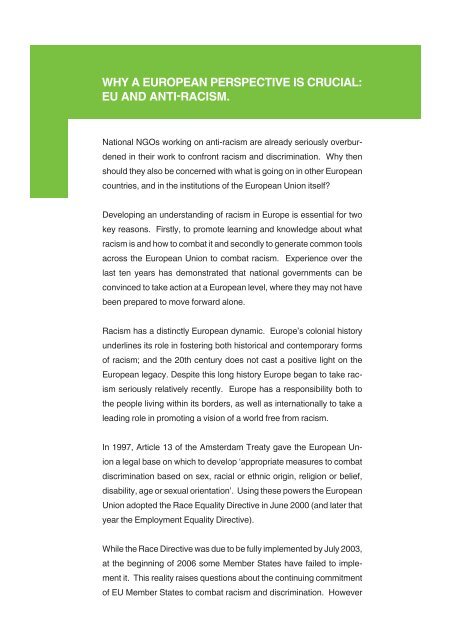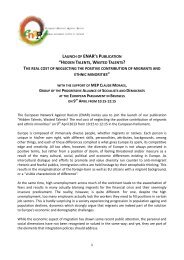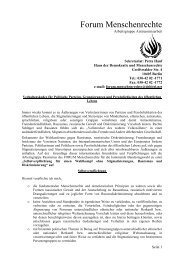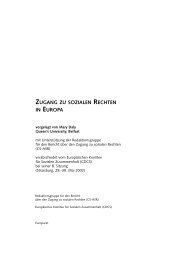Responding to racism in Spain - Horus
Responding to racism in Spain - Horus
Responding to racism in Spain - Horus
Create successful ePaper yourself
Turn your PDF publications into a flip-book with our unique Google optimized e-Paper software.
why a EuropEan pErspEctivE is crucial:<br />
Eu and anti-<strong>racism</strong>.<br />
National NGOs work<strong>in</strong>g on anti-<strong>racism</strong> are already seriously overbur-<br />
dened <strong>in</strong> their work <strong>to</strong> confront <strong>racism</strong> and discrim<strong>in</strong>ation. Why then<br />
should they also be concerned with what is go<strong>in</strong>g on <strong>in</strong> other European<br />
countries, and <strong>in</strong> the <strong>in</strong>stitutions of the European Union itself?<br />
Develop<strong>in</strong>g an understand<strong>in</strong>g of <strong>racism</strong> <strong>in</strong> Europe is essential for two<br />
key reasons. Firstly, <strong>to</strong> promote learn<strong>in</strong>g and knowledge about what<br />
<strong>racism</strong> is and how <strong>to</strong> combat it and secondly <strong>to</strong> generate common <strong>to</strong>ols<br />
across the European Union <strong>to</strong> combat <strong>racism</strong>. Experience over the<br />
last ten years has demonstrated that national governments can be<br />
conv<strong>in</strong>ced <strong>to</strong> take action at a European level, where they may not have<br />
been prepared <strong>to</strong> move forward alone.<br />
Racism has a dist<strong>in</strong>ctly European dynamic. Europe’s colonial his<strong>to</strong>ry<br />
underl<strong>in</strong>es its role <strong>in</strong> foster<strong>in</strong>g both his<strong>to</strong>rical and contemporary forms<br />
of <strong>racism</strong>; and the 20th century does not cast a positive light on the<br />
European legacy. Despite this long his<strong>to</strong>ry Europe began <strong>to</strong> take rac-<br />
ism seriously relatively recently. Europe has a responsibility both <strong>to</strong><br />
the people liv<strong>in</strong>g with<strong>in</strong> its borders, as well as <strong>in</strong>ternationally <strong>to</strong> take a<br />
lead<strong>in</strong>g role <strong>in</strong> promot<strong>in</strong>g a vision of a world free from <strong>racism</strong>.<br />
In 1997, Article 13 of the Amsterdam Treaty gave the European Un-<br />
ion a legal base on which <strong>to</strong> develop ‘appropriate measures <strong>to</strong> combat<br />
discrim<strong>in</strong>ation based on sex, racial or ethnic orig<strong>in</strong>, religion or belief,<br />
disability, age or sexual orientation’. Us<strong>in</strong>g these powers the European<br />
Union adopted the Race Equality Directive <strong>in</strong> June 2000 (and later that<br />
year the Employment Equality Directive).<br />
While the Race Directive was due <strong>to</strong> be fully implemented by July 2003,<br />
at the beg<strong>in</strong>n<strong>in</strong>g of 2006 some Member States have failed <strong>to</strong> imple-<br />
ment it. This reality raises questions about the cont<strong>in</strong>u<strong>in</strong>g commitment<br />
of EU Member States <strong>to</strong> combat <strong>racism</strong> and discrim<strong>in</strong>ation. However

















